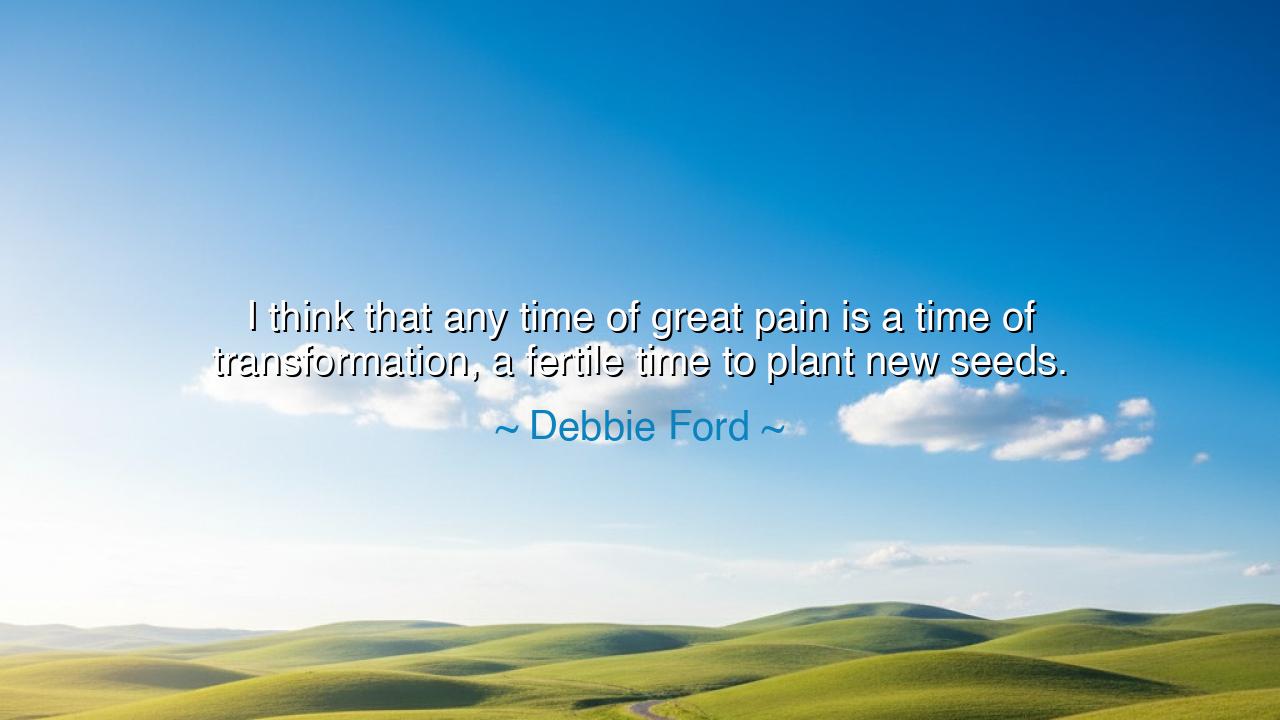
I think that any time of great pain is a time of transformation
I think that any time of great pain is a time of transformation, a fertile time to plant new seeds.






When Debbie Ford said, “I think that any time of great pain is a time of transformation, a fertile time to plant new seeds,” she was speaking to the alchemy of suffering — that mysterious power by which hardship, if faced with courage, becomes the soil of renewal. Her words are not a call to seek pain, but to recognize that within every wound lies the seed of rebirth. Pain, she teaches, is not an ending but a threshold, a sacred gate between who we have been and who we are meant to become. To resist it is to remain buried; to embrace it is to allow the spirit to bloom anew.
The origin of this wisdom arises from Ford’s own journey. She was not a philosopher by title, but a seeker of truth through experience — a woman who faced addiction, heartbreak, and the long climb toward healing. Through her writings, especially in The Dark Side of the Light Chasers, she taught that the shadow — the parts of ourselves we fear and repress — holds the key to wholeness. When she speaks of “a time of great pain,” she is speaking from the lived realization that suffering is not a curse but a crucible. It burns away illusion and forces the soul to confront its rawest essence. Only then, in the ashes of what was, can one plant the seeds of transformation — new habits, new wisdom, new life.
Pain, in this view, is not the destroyer; it is the teacher. Across the ages, the wise have known this truth. The Greek myth of the phoenix tells of a bird that perishes in flame, only to rise reborn from its own ashes — brighter, stronger, immortal. In this legend lives the same truth Ford illuminates: that the fires which seem to consume us are often the very forces that purify and renew us. Likewise, the mystics of old — from Rumi to Teresa of Ávila — spoke of “the dark night of the soul,” that season of despair through which the divine remakes the human heart. What is destroyed in that night is not the self, but the illusions that bound it.
In history, too, we see this pattern unfold. When Nelson Mandela emerged from twenty-seven years of imprisonment, he could have emerged bitter, broken, vengeful. But instead, his suffering became the fertile soil for forgiveness and wisdom. He had planted new seeds in the darkness — seeds of patience, vision, and reconciliation — and from them blossomed a new South Africa. His pain did not define him; it refined him. So too, Ford’s words remind us that our personal sorrows, however heavy, can be transformed into the power to heal and uplift others, if we dare to plant something new in their wake.
To say that pain is fertile is to see life as a living cycle. The farmer does not curse the winter, for he knows that beneath the frozen earth, life is gathering strength. Likewise, when we endure seasons of loss or despair, it may seem that all is barren — but the soul, quietly and invisibly, is preparing for its next spring. The question, then, is not whether we will suffer, but whether we will make meaning of our suffering. Those who do not resist it, but learn from it, become gardeners of the heart — planting seeds of compassion, resilience, and faith in the very ground that once brought them to their knees.
And yet, this transformation does not happen by accident. Ford’s words call us to participation — to choose consciously what we plant in the soil of our pain. In the midst of grief, we may plant gratitude. In the ruins of failure, we may plant humility. In the emptiness left by loss, we may plant love. It is through intention that sorrow becomes sacred, and through patience that wounds become wisdom. Transformation, she reminds us, is not sudden or easy; it is a slow, tender labor — a rebirth that demands time and trust.
So, my child, take this truth to heart: do not flee from the seasons of pain. They are not punishments, but passages. When life breaks you, let it break open the hard shell of pride and fear, so that something greater can take root within you. Stand amid your sorrow as the farmer stands upon the darkened field — knowing that the soil of anguish is rich beyond measure, ready for whatever seeds you dare to sow. Plant them with courage, water them with faith, and in time, you will see what Debbie Ford saw: that even from the deepest suffering, new life will rise, strong and luminous, and you will call it — transformation.






AAdministratorAdministrator
Welcome, honored guests. Please leave a comment, we will respond soon